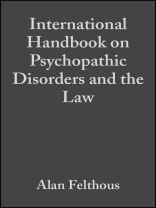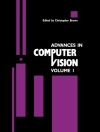Reflecting the work of an international panel of experts, the International Handbook on Psychopathic Disorders and the Law offers an in-depth and multidisciplinary look at key aspects of the development and etiology of psychopathic disorders, current methods of intervention, treatment and management, and how these disorders impact decision making in civil and criminal law.
Cuprins
Contents
About the Editors
Contributors
Preface to Volume I
Acknowledgements
Introduction to Volume I
Part IConceptual History
Chapter 1History and Conceptual Development of Psychopathic Disorders
Henning Saß, and Alan R. Felthous
Part IIAssessment
Chapter 2Psychiatric Assessment
Paul Hoff and Sabine C. Herpertz
Chapter 3Psychological Instruments in the Assessment of Psychopathy
Robert D. Hare
Chapter 4Functional and Structural Brain Imaging Research on Psychopathy
Yaling Yang and Adrian Raine
Chapter 5Psychophysiological Correlates of Psychopathic Disorders
Matthew S. Stanford, Rebecca J. Houston, Ernest S. Barratt
Chapter 6Cognitive Correlates
Herta Flor
Chapter 7Violence: Psychopathology, Risk Assessment and Lawsuits
Kenneth Tardiff
Chapter 8Risks of Diagnosing Psychopathic Disorders
Norbert Leygraf and Klaus Elsner
Part IIIEtiology and Pathogenesis
Chapter 9The Genetics of Psychopathic Disorders
David Goldmanand Francesca Ducci
Chapter 10Neuroimaging Perspectives in Pathogenesis and Therapeutic
Strategies
Jürgen L. Müller
Chapter 11Electrophysiology
Sabine C. Herpertz
Chapter 12The Role of ADHD in the Etiology and Outcome of Antisocial
Behavior and Psychopathy
Beate Herpertz-Dahlmann, Sabine C. Herpertz and Kerstin Konrad
Chapter 13Brain Trauma
Hannelore Ehrenreich, Henning Krampe and Anna-Leena Sirén
Chapter 14Acquired Psychopathy and the Assessment of Traumatic Brain
Injury
Robert P. Granacher, Jr. and Manish A. Fozdar
Chapter 15Comorbidities of Psychopathy and Antisocial Personality Disorder:
Prevalence and Implications
Elena Carmen Nichita and Peter F. Buckley
Chapter 16The Paraphilias and Psychopathy
John M.W. Bradford, Philip Firestone and A.G. Ahmed
Chapter 17’Family Upbringing’: Family Factors as Predictors for the
Development of Antisocial Behavior and Psychopathy Dimensions
Maya K. Krischer, Kathrin Sevecke and Gerd Lehmkuhl
Chapter 18Discipline by Parents and Child Psychopathology
Emily M. Douglas and Murray A. Straus
Chapter 19Social Origins of Psychopathy
David P. Farrington
Chapter 20A Psychoanalytic View of the Psychopath
J. Reid Meloy and Andrew Shiva
Chapter 21Women and Girls with Psychopathic Characteristics
Tonia L. Nicholls, Candice L. Odgers, and David J. Cooke
Chapter 22Educational Issues
Franz Petermann and Ute Koglin
Part IVIntervention, Treatment and Management
Chapter 23Intervention, Treatment and Management of ADHD
Beate Herpertz-Dahlmann, Kerstin Konrad and Sabine C. Herpertz
Chapter 24Pharmacotherapy of Clinical Aggression in Individuals with
Psychopathic Disorders
F. Gerard Moeller and Alan C. Swann
Chapter 25Treatment and Management of Conduct Disorders in Children and
Adolescents
Manfred Döpfner, Kerstin Adrian and Charlotte Hanisch
Chapter 26Psychotherapy of the Psychopathic Disorders
Gill Mc Gauley, Gwen Adshead and Sameer P. Sarkar
Chapter 27Comprehensive Outpatient Treatment and Management
Andreas Hill, Peer Briken and Wolfgang Berner
Chapter 28Antisocial Disorders and Domestic Violence: Treatment
Considerations
L. Kevin Hamberger and Jennifer Langhinrichsen-Rohling
Chapter 29Workplace Violence Goes Beyond Psychopathology
Michael H. Corcoran
Chapter 30Addressing the Associated Conditions of Drug and Alcohol Abuse
Falk Kiefer and Karl Mann
Chapter 31Experiential and Community Treatment of Adult Antisocial
Syndromes
Stephen A. Thorne and William H. Reid
Chapter 32Legal, Medical and Social Impediments to better Psychopaths:
How Best to Deal with Persons with Psychopathic Disorders?
Jürgen L. Müller
Chapter 33Social Policy Considerations and Psychopathic Disorders
Harald Dreßing, Hans Joachim Salize and Peter Gass
Author Index
Subject Index
Despre autor
Alan R. Felthous, M.D., is Professor and Director of
Forensic Psychiatry in the Department of Neurology and Psychiatry,
Saint Louis University School of Medicine. He received his Bachelor
of Sciences degree at the University of Washington and his medical
doctorate at the University of Louisville School of Medicine before
interning at Roosevelt Hospital in New York city and completing a
residency in psychiatry at Mc Lean Hospital and Harvard Medical
School. After two years as a staff psychiatrist at the Naval
Regional Medical Center in Oakland, Dr. Felthous joined the staff
at the Menninger Foundation in Topeka, Kansas. For nearly 15 years,
he was Chief o the Forensic Services, the Department of Psychiatry
and Behavioral Sciences at the University of Texas Medical Branch
in Galveston, where he was the Marie B. Gale centennial Professor
of Psychiatry. Before coming to Saint Louis University, Dr.
Felthous was Director of Forensic Psychiatry at Southern Illinoi8s
University School of Medicine and Medical Director of Chester
Mental Health Center, the maximum security forensic hospital for
the state of Illinois. Dr. Felthous is President of the American
Academy of Psychiatry and the Law, Senior Editor of behavioral
Science sand the Law and Past President of the American board of
Forensic Psychiatry. His research, scholarly and teaching interests
focus on clinical aggression, the psychopathology of criminal
behavior, legal requirements of clinicians in managing potentially
violent patients, and jail and prison suicide.
Henning Saß, M.D., is currently Medical Director and
Chairman of the board of Directors at the University Hospital of
the University of Technology (RWTH) in Aachen/Aix-la-Chapelle,
Germany. He studied medicine at the universities of Kiel, Vienna
and Mainz. After passing the state examination in Kiel and
receiving his medical doctorate in Mainz, he was a resident in the
Department of Psychiatry at the University of Heidelberg. Having
completed his training in clinical psychiatry and in psychotherapy,
he concentrated on forensic psychiatry, general psychopathology,
diagnostic research and personality disorders. His habilitation on
Psychopathie, Soziopathie, and Dissozialitat (Psychopathy,
Sociopathy and Dissocial Behaviors) was published as a Springer
monograph in 1987. He was then appointed Professor of Forensic
Psychiatry at the Ludwig-Maximilians-University in Munich, after
which he was the Chair of Psychiatry and Psychotherapy at the
medical faculty in Aachen for 10 years, before he was appointed to
his current position. His research interests remain focused on
forensic psychiatry, especially in the field of personality
disorders. During his academic career, he was President of the
German Society for Psychiatry, Psychotherapy and Nervous Diseases
(DGPPN) and of the Association of European Psychiatrists (AEP). He
is editor or co-editor of several scientific journals and member of
numerous boards of scientific organizations including the European
Brain Council and the Research Council of the German Ministry for
Science, Research and technology.












